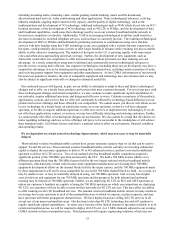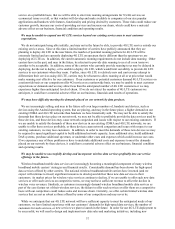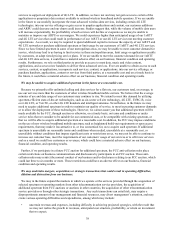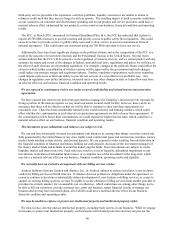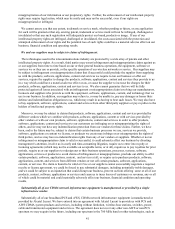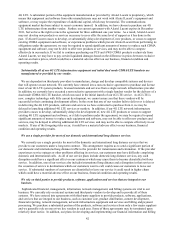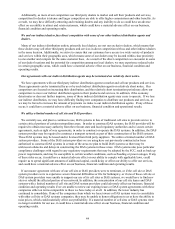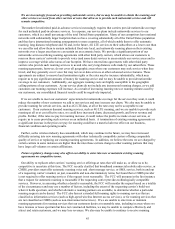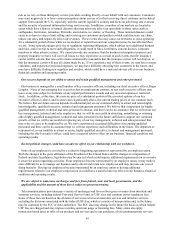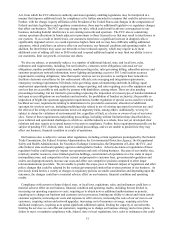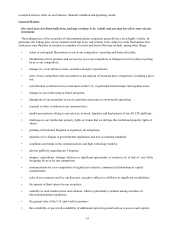Metro PCS 2010 Annual Report Download - page 55
Download and view the complete annual report
Please find page 55 of the 2010 Metro PCS annual report below. You can navigate through the pages in the report by either clicking on the pages listed below, or by using the keyword search tool below to find specific information within the annual report. 45
We are increasingly focused on providing nationwide service, but we may be unable to obtain the roaming and
other services we need from other carriers at rates that allow us to provide such nationwide service and still
remain competitive.
The market for unlimited paid-in-advance services increasingly requires that carriers provide nationwide coverage
for such unlimited paid-in-advance services. In response, our service plans include nationwide services to our
customers, which is a small percentage of the total United States population. Many of our competitors have national
networks with substantially larger footprints than we have covering substantially all of the United States population
and they have international roaming arrangements to more countries, all of which enable them to offer automatic
roaming, long distance telephone and 3G and, in the future, 4G LTE services to their subscribers at a lower cost than
we can offer and allow them to sustain unlimited fixed-rate local, and nationwide roaming plans on their existing
networks over a larger area than we can sustain on an economic basis. We provide a significant portion of our
nationwide services utilizing roaming agreements with other third party carriers, which allows our customers to
roam on those carriers’ networks to provide voice (and some data) services to areas outside our service areas and to
improve coverage within select areas of our footprint. We have entered into agreements with other third party
carriers who provide such roaming services to us and who carry long distance calls made by our subscribers. These
roaming agreements, however, do not cover all geographic areas where our customers may seek service when they
travel, and they generally cover voice but may not cover data services or other advanced service features. These
agreements are subject to renewal and termination rights or the rates may be increase substantially, which may
require us to pay significant amounts of money for roaming service and we may be unable to provide nationwide
coverage to our customers. Additionally, our aggregate roaming costs are highly susceptible to the geographic
calling patterns of our customers. As our service plans do not include any incremental roaming charges, as we add
customers our roaming expenses will increase. As a result of increasing roaming rates or roaming minutes used by
our customers, our consolidated financial results could be negatively impacted.
If we are unable to meet our customers’ expectations for nationwide coverage for the services they want, it could
reduce the number of new customers we add to our services and may increase our churn. We also may be unable to
provide roaming for certain services, such as 4G LTE data, at all or the rates may not be acceptable to our
customers. If our customers demand roaming services, such as 4G LTE roaming, and we are unable to provide such
roaming at all or at cost effective rates, we could have increased churn, decreased growth, and lower revenue and
profits. Further, if the rates we pay for roaming increase, it could reduce the profits we make on our services, or
require us to cease providing such services on an unlimited basis. A termination of existing roaming agreements or
a significant increase in the prices we pay for roaming could have a material adverse effect on our business,
financial condition and operating results.
Further, as the wireless industry has consolidated, which may continue in the future, we may have increased
difficulty entering into new roaming agreements with other technically compatible carriers offering comparable
quality of service or replacing our existing roaming agreements. In addition, we believe the rates we are charged by
certain carriers in some instances are higher than the rates these carriers charge to other roaming partners that may
have large call volumes or certain affiliations.
Future regulatory changes may also affect our ability to enter into new or maintain existing roaming
agreements on competitive terms.
Our ability to replicate other carriers’ roaming service offerings at rates that will make us, or allow us to be,
competitive is uncertain at this time. The FCC recently clarified that broadband commercial mobile radio service, or
CMRS, providers must offer automatic roaming voice and short message service, or SMS, service, both in and out
of a requesting carrier’s market, on just, reasonable and non-discriminatory terms, but found that a CMRS provider
is not required to offer roaming services if the request is not reasonable. The FCC will presume in the first instance
that a request for automatic roaming is reasonable if the requesting carrier provides technologically compatible
services. However, in assessing whether a denial is reasonable, the FCC will consider the request based on a totality
of the circumstances and may use a number of factors, including the extent of the requesting carrier’s build-out
where it holds spectrum, and whether alternative roaming partners are available, to determine whether a particular
roaming request can be denied. The FCC also has not extended full roaming rights to roaming services that are
classified as information services (such as high-speed wireless Internet access services), or for roaming services that
are not classified as CMRS (such as non-interconnected services). If we are unable to enter into or maintain
roaming agreements for roaming services that our customers desire at reasonable rates, including in areas where we
have licenses or lease spectrum but have not constructed facilities, we may be unable to compete effectively and
attract and retain customers, and we may lose revenues. We also may be unable to continue to receive roaming


